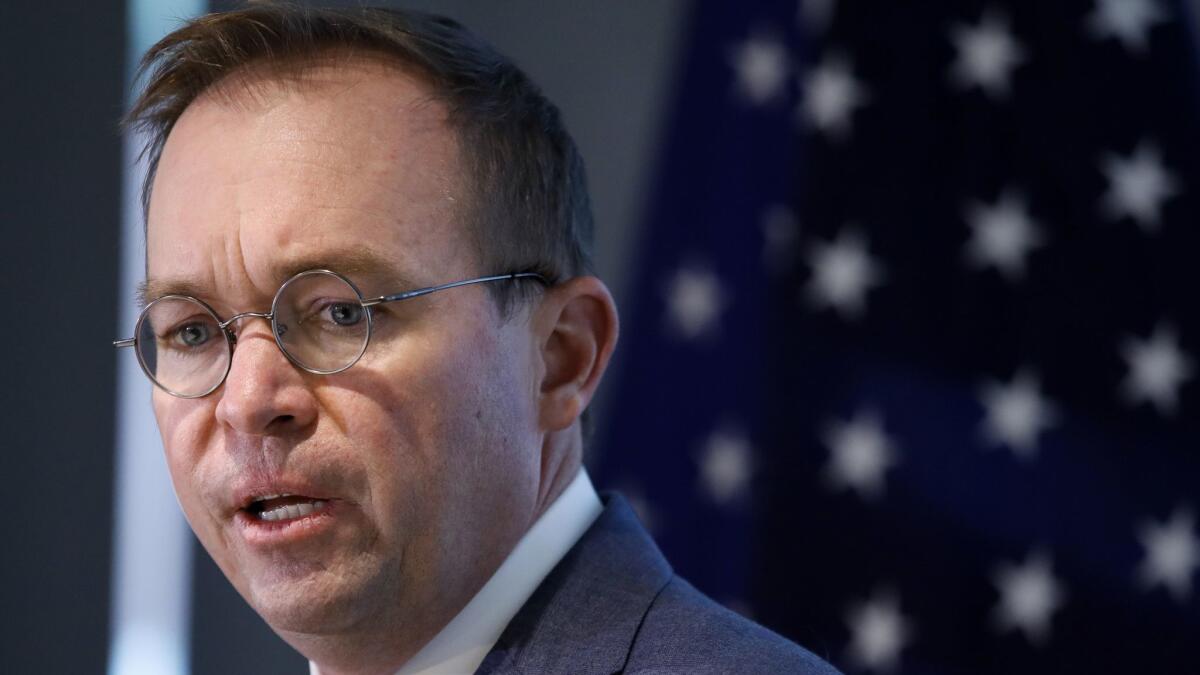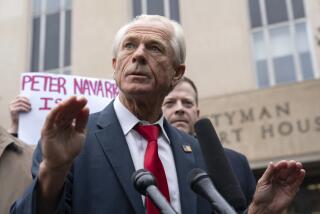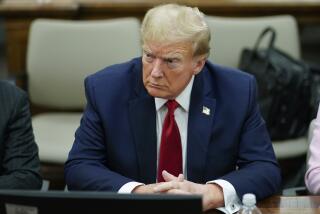Federal judges indicate they could remove Mulvaney as acting CFPB chief

Judges on a federal appeals court panel Thursday appeared hesitant to overrule President Trump and install the deputy director of the Consumer Financial Protection Bureau as the agency’s temporary leader.
But two of the three judges from the U.S. Court of Appeals for the D.C. Circuit indicated they had a problem with the person Trump selected to take the position, Mick Mulvaney, because he also heads the White House Office of Management and Budget. The 2010 law that created the bureau as an independent federal agency specifically said OMB should not have oversight or jurisdiction over it.
That raised the possibility that the legal battle over the future of the watchdog agency could end with Mulvaney’s removal as acting director — a move that would be cheered by Democrats and consumer advocates who have complained about his public opposition to the bureau’s existence.
But Mulvaney would not be supplanted as they want by Deputy Director Leandra English, who brought the suit to remove him after his appointment by Trump last fall. Under such a ruling, English might be elevated to acting director for at best a day or so until Trump simply named another person to serve as acting director, pending appointment of a permanent director needing Senate confirmation. Or the administration might appeal such a ruling to the full appeals court.
The judges on the panel — Thomas B. Griffith, Patricia A. Millett and Judith W. Rogers — all seemed as if they did not want to take the rare step of telling a president how to fulfill his constitutional duties to appoint executive branch officials.
“Unless you can enjoin the president here, I don’t see how she gets her relief,” Griffith told English’s attorney, Deepak Gupta, during the hourlong hearing in a Washington courtroom. The audio of the oral arguments was streamed live over the internet because there was so much interest in the case.
As the hearing wrapped up, a few blocks away at the U.S. Capitol, Mulvaney faced questions from members of the Senate Banking Committee.
It was his second day of hearings as the bureau’s acting director. As at the House Financial Services Committee hearing on Wednesday, Democrats said he was not the lawful acting director at another often-contentious hearing in which Mulvaney answered questions even though he asserted he wasn’t required to under the law that created the bureau.
Mulvaney has moved quickly to make his mark on the bureau, stressing his approach would be very different than that of his predecessor, Democrat Richard Cordray.
Mulvaney has scaled back enforcement efforts, said he would no longer “push the envelope” to enforce consumer protection laws and changed the bureau’s mission statement to make weeding out “outdated, unnecessary or unduly burdensome regulations” the top priority.
Sen. Elizabeth Warren (D-Mass.), who conceived of the agency and then helped launch it as an Obama administration aide, reminded Mulvaney on Thursday that he often voted when he was a Republican congressman to kill the bureau. Then she listed several instances in which the bureau obtained millions of dollars in refunds for consumers, arguing those wouldn’t have happened if he had gotten his way.
“You’ve taken obvious joy in talking about how the agency will help banks a lot more than it will help consumers and how upset this must make me. But here’s what you don’t get, Mr. Mulvaney: This isn’t about me,” Warren told him in a highly anticipated showdown after they’ve exchanged sharply worded letters since he took over as acting director.
“This is about active-duty military. It’s about first responders and students and seniors and families … and millions of other people who need someone on their side when consumers get cheated,” she said. “You’re hurting real people to score cheap political points.”
Mulvaney offered no response. But the political dispute over the bureau’s existence was clear when the next questioner, Sen. Tom Cotton (R-Ark.) asked Mulvaney, “How does it feel to lead an unconstitutional agency?”
The dispute over acting leadership of the agency began Nov. 24 when Cordray stepped down as bureau director. He promoted English, his chief of staff, to deputy director and said she would be the acting director under a provision of the 2010 Dodd-Frank Wall Street Reform and Consumer Protection Act that created the bureau.
Within hours of Cordray’s resignation announcement, Trump appointed Mulvaney to fill the post under the Federal Vacancies Act of 1998. The administration said that law allowed Trump to appoint an official who already had been confirmed by the Senate in another capacity to also serve as the bureau’s acting director.
English went to court but Judge Timothy J. Kelly of the U.S. District Court for the District of Columbia, a Trump appointee, denied her request for a temporary restraining order to remove Mulvaney and install her as acting director.
The restraining order decision could not be appealed, so English’s attorney, Gupta, filed for a preliminary injunction. After hearing nearly two hours of arguments on the injunction, Kelly also denied that request in January.
English appealed and the case was randomly assigned to a three-judge panel. Two of the judges, Millett and Rogers, were appointed by Democrats. Griffith was appointed by President George W. Bush.
Part of English’s argument against Mulvaney is that he should not be the bureau’s acting director because he serves at the pleasure of Trump as the OMB chief. Mulvaney is juggling both jobs right now.
Gupta argued that made Mulvaney uniquely unlawful to be the bureau’s director because Dodd-Frank specifically insulated the agency from OMB oversight.
“I don’t see how Mr. Mulvaney can be in the bureau and not be violating the provision every day he is there,” Gupta told the judges.
Millett and Rogers appeared sympathetic to that argument.
“The end result of appointing Mr. Mulvaney is everything the CFPB director is going to decide is going to be approved by the OMB director,” Millett told Justice Department lawyer Hashim Mooppan, who was arguing in Mulvaney’s favor. “He’s wearing two hats at the same time.”
Mooppan said in response that Congress did not specifically prohibit the OMB director from serving as acting CFPB director in the law.
All three judges ruled in the consumer bureau’s favor in January in another case. In a 7-3 ruling, the full court found the bureau’s structure is constitutional.
The ruling said that Congress acted appropriately in mandating that the bureau’s single director — who serves a five-year term after being nominated by the president and confirmed by the Senate — can only be removed by the president for inefficiency, neglect of duty or malfeasance in office.
Most presidential appointees can be removed at will and usually depart when a new president takes office.
The decision reversed a 2-1 ruling in 2016 by a three-judge panel of the court that found that the bureau’s structure violated the Constitution’s separation of powers because it limited the president’s authority.
That earlier ruling said the solution was to strike down the law’s “for cause” provision, meaning that the president could remove the bureau’s director for any reason, as with other executive branch appointees.
The CFPB appealed the 2016 ruling, backed by the Obama administration’s Justice Department.
After Trump’s election, the Justice Department reversed its position and told the full court that the president should be able to fire the bureau’s director at will.
The law under which Trump appointed Mulvaney allows him to serve for as long as 210 days, assuming the court does not remove him. Mulvaney told lawmakers his clock would run out on June 22.
But if Trump nominates a permanent director, Mulvaney can stay in the acting position while the nomination is pending in the Senate. The 210-day clock starts again if the Senate rejects a nomination.
Twitter: @JimPuzzanghera
UPDATES:
9:30 a.m.: This article was updated with remarks by lawmakers at the Senate Banking Committee hearing.
This article originally was published at 9 a.m.







